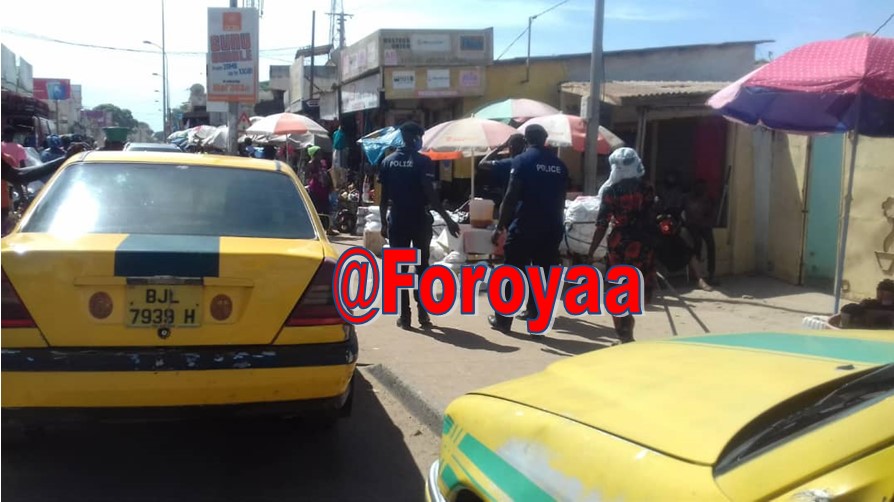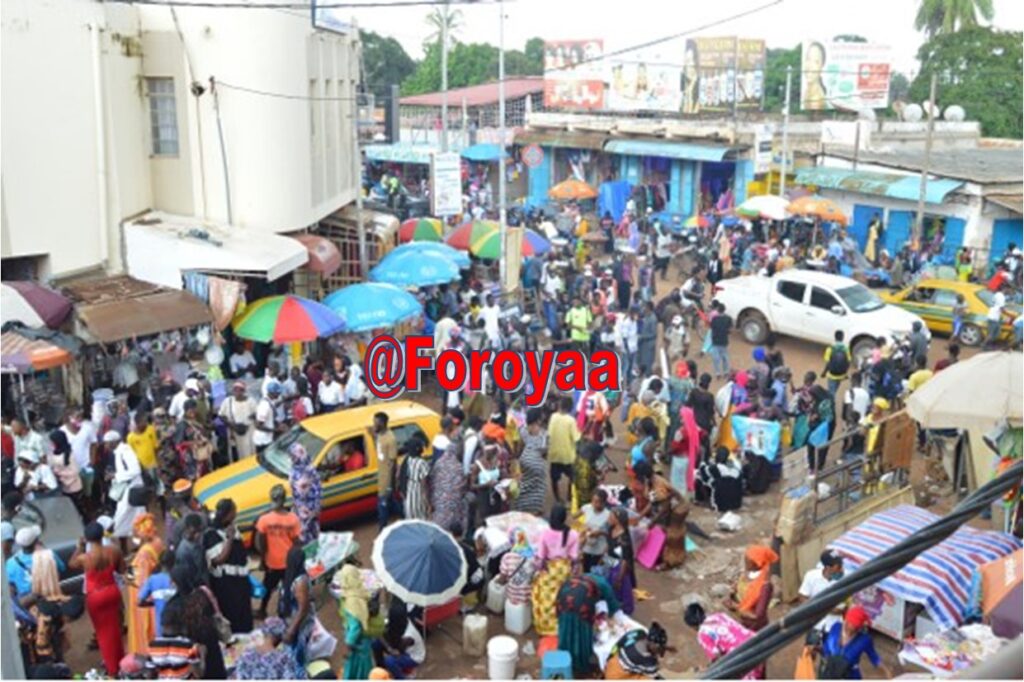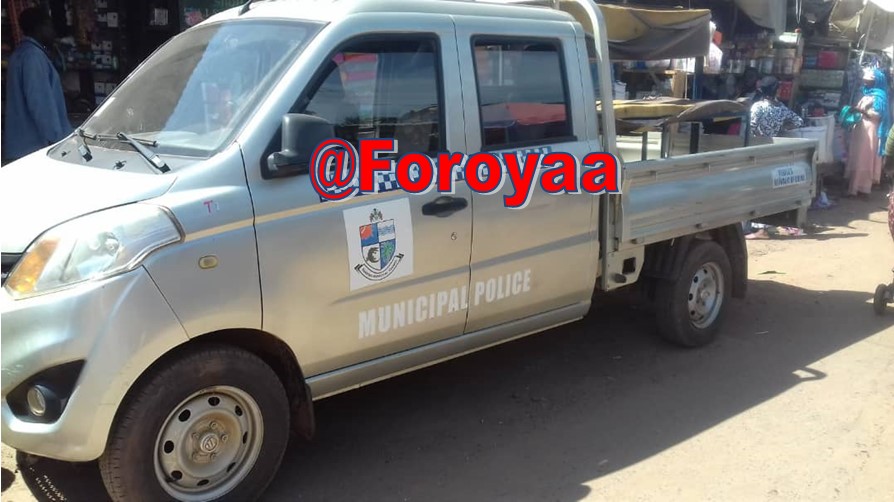By Yankuba Jallow
Isatou Jallow is a street vendor who is contemplating leaving the business for other gainful ventures. Jallow said street vending in the Kanifing Municipality comes along with hardship with little profit which is not capable of uplifting their living conditions.
“I am tired of life. I want to leave vending because I am not earning anything from it,” Jallow said.
Jallow, like many others wake up in the early hours of the morning when everyone is on bed to find her way to the market. She purchases goods from women on credit and sells till a little after noon and goes home. Before going home, she buys food items which she takes home and cooks for the family to eat.
“Often, I incur loss in my business because I don’t have a place to place my goods to sell,” the resident of Sukuta said.
She decried that she carries her goods every day and scrambles for available space to place her goods for sale.
“Anywhere you place your goods, if the police find you there, they will take it from you and you will never get it back,” she said.
She said whenever she is selling in the street, she always monitor the movements of the police.
“If we see them [referring to the police]coming, we carry our goods and run away to other places in search of a place to settle down and sell,” she said.

She said neither the Government nor the Council has identified any place for them to use, adding the market is full. She said she usually pays D10 to Council tax collectors, but whenever she starts selling her goods, the police would chase her away.
“We roam every day in search of a place to sell our goods. The market is full and it cannot accommodate us,” she said.

She cried out that her family is facing the consequence because they solely rely on her for food and other needs including supporting her young children’s education. Isatou’s husband Amadou is a woodcutter who barely comes home as he stays in Cassamance – Senegal for months burning charcoal. Amadou’s business has been impacted by the restriction on the transportation of charcoal and timber trade in The Gambia by the Senegalese forces.
“We are renting and this makes life very difficult for us,” she said.
Jallow is living with a land lady who according to her does not skip a month in asking for the monthly rent fees of D800.
“I am looking for better options and if I see any, I will stop this vending business because it is not gainful to me and my family,” she said.
Almost all streets in Serrekunda have street vendors. Every morning, market vendors, mainly women would leave their homes as early as 4:30 am for the markets to sell their commodities, but sometimes their items are impounded by municipal police.

The police would quarrel with women vendors every day and would take away their goods from the street to give space for vehicles to pass. The vendors sell fruits, vegetables and fish among others.
The vendors have complained that the Council is forcing them to go into the Serrekunda Market when they know with certainty that the market cannot accommodate all of them.
A 36-year-old widow informed Foroyaa that she lost her husband about 3 years ago and since then she has been the breadwinner of her young family.
Mariama Sanyang said she is ever ready to go into the market provided the Council provides her space inside.
“I don’t know what to do now because we are told not to sell in the streets when they wouldn’t provide us with space. We cannot get into the market because it is full and they won’t allow us to sell in the street,” she said.
The resident of Latrikunda said without this trade, her family will suffer because their education and feeding all depend on what she earns from the streets.
“No matter what the Council does, they cannot stop us from selling because we need to survive. Let them provide us with space and stop chasing us like criminals,” Sanyang said.
One Binta Ceesay from Bakoteh said the municipal police most of the times take their commodities and throw them in their vehicles – pickup trucks. She explained that some of their goods are perishable and when the municipal police take them, they end up spoiling.
“I’m not a farmer. I usually get the goods on credit and resell it at the market. The profit I make is not much. Anytime the municipal police take my goods, I always run into losses because the goods end up spoiling. I go home with empty hands and my family suffers,” she said.
The tearful vendor was found sitting at a corner crying after municipal police took away her goods on Wednesday, 19th November 2020.
“I spent nine hundred and seventy dalasi to buy those goods that the municipal police took away. I pay fares to the market and I have already paid daily dues of D10 to the Council tax collector. I have not made any sales yet and now the police took away my good,” the crying vendor said.
She said she has nothing to take home to feed her family adding she is tired of life.
“I am exhausted about street vending. It is tiring,” she said.
She added: “I have given up on my business now. If you come here you will not get anything pleasant. You are treated like a criminal and your goods are taken away by the [municipal]police.”
She said the Government and Council should endeavour to provide them with space for them to sell rather than sending police to take away their goods away from them.
Binta Fadera, a street vendor from Tanji while narrating her ordeal said it is normal for them to be moving around town with their goods in search of a place to sell in the street.
“Anytime we see the police coming, we quickly pack up our goods and start running. At times some of us fall on the ground and sustain bruises,” she said.
Fadera was found hiding at a nearby household panting after escaping from municipal police who were chasing her.
“This is how I have been doing since morning. I brought Cassava leaves, but the municipal police wouldn’t give me the chance to sell,” she said.
Fadera left her three-year-old son at home and will only go home a little before 2 pm every day.
The resident of Tanji said becoming a street vendor was not her fault, but the fault of the Gambia Government and Council who failed in their duty to provide them with space to sell.
The 42-year-old said the majority of the vendors are women and they are the breadwinners of their respective families.
“People leave their homes early in the morning to come here [in Serrekunda]to sell, but most of the times we end up going home with disappointment. We did not come here to commit any crimes,” she said.
She said taking away their goods is not right because the Council has not shown them any space for them to occupy and sell their goods.
Speaking to a municipal police who wished not to be quoted, he said they were asked to chase women found in the street obstructing the traffic especially the road linking the Market to the Serekunda Clinic. He admitted that they usually seize the goods of women found selling in the street.
KMC authorities were approached for comments, but were in a Council meeting. Further calls proved unsuccessful. We will follow-up with the Council.


